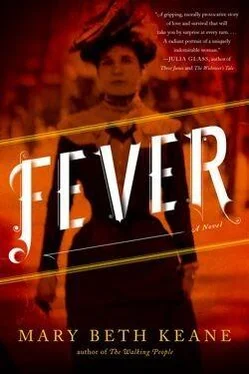Once in Minneapolis he found the riverfront and got a job loading sacks of flour as big as a man for the Gold Medal Factory. The boardinghouse he found was cleaner than any he’d seen in New York, the people less threatening. They all looked at Alfred with some curiosity and after a few days he realized he was the one they thought of when they locked their doors. The worst of his arm was visible only during the inside hours, when the men worked so hard they started steaming, and Alfred rolled up the cuffs of his shirt. The nuns had given him a bad haircut and he hadn’t shaved since Harlem. He needed to clean his clothes. He needed to find a doctor and a druggist. Seeing the bruises on his arm, and on the other arm, the deformed skin, a man on his shift suggested a place on Hennepin Avenue that would help him. A smoking lounge, the man called it, and Alfred went there expecting it to be run by a Chinese, but like everything else in Minneapolis it was run by a white — a lean man, once blond, with a beard and a caftan tied around the middle with a rope. The man had come to Minneapolis from San Francisco and greeted Alfred as though he might be a long-lost brother from the opposite coast. “They’re different here,” the man informed Alfred. He instructed him on how to hold the pipe, and waved a hand toward the chairs scattered around the eerie silence of the room. Alfred didn’t respond, so the man returned to the front room, and no one spoke to Alfred.
He chose a rocking chair by the window, which faced the Mississippi and a little island in the middle of the river. He thought of Mary and her hut. When he closed his eyes he saw her pacing, looking out across the water toward him. He wondered if she’d gone looking for him since the accident. He assumed Jimmy Tiernan had told her what happened, and he knew he should send her a letter. He hadn’t had a drink since Christmas 1910. He would tell her that. Or maybe it would be better to wait until he’d been north, seen what it had to offer, seen what kind of life they could make there.
After two weeks he began asking for work up north, clearing land. The men he spoke with told tales of snow that reached the tops of trees, air so cold it would freeze a man’s pecker in under three seconds if he went out to take a leak. The fish froze in the rivers. Birds that didn’t go south dropped from the trees like stones and woke up again in the spring melt to fly away. He’d have to drag his food out there and back. He’d have to pack enough for four months, at least, maybe five. He’d have to be strict about what he ate so he wouldn’t run out. “Cover up that arm when you go looking for work,” a man advised him. “No one will want to see that coming.”
“It’s ugly but it’s fine,” Alfred said, looking at the skin of his right arm. It reminded him of candle wax, melted, lopsided, dips and ridges where the wax ran free. He couldn’t feel anything on the surface of that arm, and so sometimes he had to look down at it to see if his shirt sleeve was rolled up or down. Sometimes he dug his fingernails in, hard, but all he felt was pressure on the bone.
“No, I mean that,” the man said, taking hold of Alfred’s good arm and holding it to the light. “What are you going to do about that?”
Alfred pulled his arm away and, quick as a gasp, had the other man’s arm twisted behind his back. “Don’t touch me,” he growled. The man didn’t speak to him again.
Hauling flour was exhausting work, and at night, he slept from the moment his head touched the pillow to the moment the sun reached his face. He heard of a clinic alongside Lake Harriet where the doctors understood about pain management, and gave out prescriptions for those who could pay for it. Alfred showed his injuries to a Dr. Karlson and explained his plan to go to the North Country after Christmas and work up there until spring. Dr. Karlson wrote a prescription for a winter’s worth of tablets and four large bottles of tincture, plus additional morphine, two more needles, another syringe. Alfred paid for all of it, and noted that he was going north just in time. The drugs were cheap — a vial of morphine was cheaper than a bottle of whiskey — but still, his stack of money was growing lighter every day. The doctor told Alfred to try to limit his intake or he might have stomach trouble, difficulty getting going in the morning, problems sustaining energy throughout the day. Stay out of the dens, he warned Alfred. The smoking opium was mostly smuggled, and who knew what went into it. Stick to the prescription stuff, the stuff that had been checked out by the Board of Health. He took the tincture in the mornings and felt it travel his body as he ate his breakfast. The pills he kept in his pocket. The needles he saved for night. The itch that always began a few minutes after waking subsided by the time he began his walk to the riverfront, and everything seemed at arm’s-length, as if he were looking at someone else’s life. Before, in New York, he was so much a part of his own life that it nearly drowned him, but now, it was as if he floated alongside himself, and when something wasn’t quite right, he could simply lean over and make an adjustment.
At the boardinghouse, Christmas was acknowledged with bread pudding, a round of carols, and mulled wine. A French Canadian named Luc, part Indian, sold him an overcoat from the Hudson Bay Company. From a consignment store he bought heavy blanket trousers and a shoe pack, and the patient clerk showed him how to ease them on over two pairs of socks. If he did it right, the man swore, his feet would stay warm and dry. He bought two pairs of thick wool socks, two shirts, two vests, a fur cap.
In mid-January, Luc told him about a pair of brothers who’d purchased several acres on the cheap, and needed a pair of good axmen. “Are you handy with an ax?”
“Sure,” Alfred said.
“I’ll bet you are,” Luc said, but told him to meet him in a few days. When the day came, Alfred showed up wearing all the clothes he owned to find Luc had organized everything they would need onto two toboggans. When Alfred tugged his he guessed it weighed three hundred pounds. They had cornmeal, flour, lard, butter, a variety of smoked fish, ham, rice, molasses, axes, matches, picks, spades, hoes, sugar, guns, powder, and shot. Alfred had a season’s worth of medicine buttoned into his interior pockets, and could hear the faint rattle of the tablets as he moved. Luc had arranged for a wagon to carry them to the crossroads nearest to the brothers’ camp, and then they went the last twelve miles on foot, their toboggans sliding so easily along the crust of ice on the top layer of snow that they left no tracks.
They came upon the brothers after four hours of walking. Gustaf and Eric had made their camp on the edge of a pine grove, against a fallen tree trunk almost six feet thick. When they saw Luc and Alfred they stopped their work and walked over to pull the toboggans the rest of the way. The camp was as clever as Luc had described — poles cut neatly and laid sloping from the snow to the top of the tree trunk, topped with layers of spruce boughs and covered over by a rubber blanket. The brothers had banked the snow on the back and sides of this little structure, and built a fire in front. Each man had two blankets, and there was a pot slung over the fire.
It was a clean place, as sterile as white cotton, and Alfred felt his lungs growing stronger, his body becoming cleaner. Luc showed him how to wield the ax, how to bend the saw, and he got faster at it every day. Gustaf and Eric saw his burns and didn’t question him when he administered his medicine at night, nor in the morning when he washed the pills down with black coffee. His body worked like a machine and there was peace in the sweating, the breathing, the aching at night that was so completely different from the ache of his hips after lying in a hospital bed for almost a year. He ate more in one sitting than he used to eat in New York over an entire day. The older of the brothers commented that Alfred was getting stronger, and Alfred knew it was true. He held one side of the saw and Luc or one of the Swedes held the other, and where it used to take fifty passes to cut through a trunk, now it took a dozen, sometimes less. Back and forth, back and forth, the teeth of the saw bit deeper into the pale interior of the trunk and he’d feel his heart throbbing when the Swede pulled for the last time, held up his hand to watch the tree fall. They dragged the timber to the river where, in the spring, they’d trade it for meat and fresh fruit.
Читать дальше












